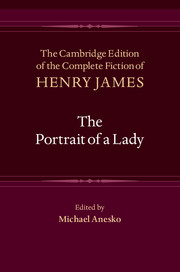Book contents
- Frontmatter
- Contents
- List of Illustrations
- Acknowledgments
- List of Abbreviations
- General Editors’ Preface
- General Chronology of James’s Life and Writings
- Introduction
- Textual Introduction
- Chronology of Composition and Production
- Bibliography
- The Portrait of a Lady
- Glossary of Foreign Words and Phrases
- Notes
- Textual Variants
- Emendations
- Appendices
Chapter 51
Published online by Cambridge University Press: 11 April 2021
- Frontmatter
- Contents
- List of Illustrations
- Acknowledgments
- List of Abbreviations
- General Editors’ Preface
- General Chronology of James’s Life and Writings
- Introduction
- Textual Introduction
- Chronology of Composition and Production
- Bibliography
- The Portrait of a Lady
- Glossary of Foreign Words and Phrases
- Notes
- Textual Variants
- Emendations
- Appendices
Summary
THE Countess was not banished, but she felt the insecurity of her tenure of her brother's hospitality. A week after this incident Isabel received a telegram from England, dated from Gardencourt, and bearing the stamp of Mrs. Touchett's authorship. “Ralph cannot last many days,” it ran, “and if convenient would like to see you. Wishes me to say that you must come only if you have not other duties. Say, for myself, that you used to talk a good deal about your duty and to wonder what it was; shall be curious to see whether you have found out. Ralph is dying, and there is no other company.” Isabel was prepared for this news, having received from Henrietta Stackpole a detailed account of her journey to England with her appreciative patient. Ralph had arrived more dead than alive, but she had managed to convey him to Gardencourt, where he had taken to his bed, which, as Miss Stackpole wrote, he evidently would never leave again. “I like him much better sick than when he used to be well,” said Henrietta, who, it will be remembered, had taken a few years before a sceptical view of Ralph's disabilities. She added that she had really had two patients on her hands instead of one, for that Mr. Goodwood, who had been of no earthly use, was quite as sick, in a different way, as Mr. Touchett. Afterwards she wrote that she had been obliged to surrender the field to Mrs. Touchett, who had just returned from America, and had promptly given her to understand that she didn't wish any interviewing at Gardencourt. Isabel had written to her aunt shortly after Ralph came to Rome, letting her know of his critical condition, and suggesting that she should lose no time in returning to Europe. Mrs. Touchett had telegraphed an acknowledgment of this admonition, and the only further news Isabel received from her was the second telegram which I have just quoted.
Isabel stood a moment looking at the latter missive, then, thrusting it into her pocket, she went straight to the door of her husband's study. Here she again paused an instant, after which she opened the door and went in. Osmond was seated at the table near the window with a folio volume before him, propped against a pile of books.
- Type
- Chapter
- Information
- The Portrait of a Lady , pp. 514 - 527Publisher: Cambridge University PressPrint publication year: 2016

